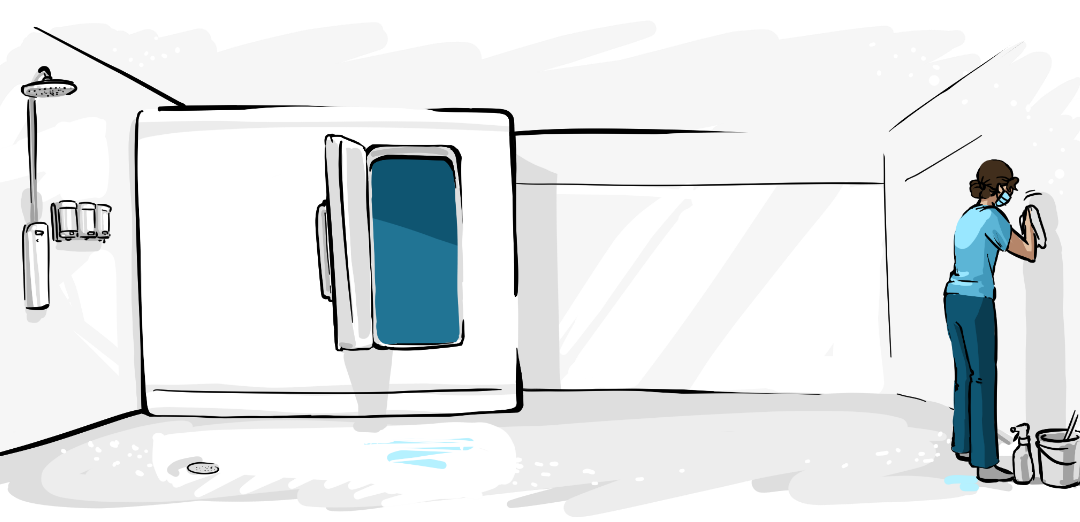There are lots of us who may want to start floating again, but may also reasonably ask if this is the right time to do so. After all, going anywhere right now carries a certain amount of risk along with it. Businesses are facing the difficult situation of how to keep people safe, and how to make sure we can continue to support ourselves long term. Needless to say, the situation has been more than a little stressful!
Normally, in a situation like this, we would leap at the opportunity to get into float tanks. The environment seems tailor-made for crises like this. We can isolate, de-stress, and there’s evidence to suggest that floating and improved mindfulness can strengthen the immune system.
Many people are prioritizing activities and only going out when necessary. Trips to the grocery store are essential and also carry a certain amount of risk. But as we go on with our lives and create a new normal, we need to discuss how to also prioritize the things that help bring balance to our lives like floating.
The good news is that float tanks have a few things about them that generally make them safer than other wellness modalities. Here’s a few things to remember about how much safer floating is than most activities in a COVID world:
- They’re unmanned: At no point do you need to directly interact with practitioners in order to feel the full benefits of floating.
- Cleanliness: This has always been a big deal for us and there are many factors that make float tanks and rooms much cleaner than other public spaces. Check out our Cleaning and Disinfection section on our floating 101 page to get the full rundown. Not only do guests shower before and after the float, but our inter-session cleaning and disinfection protocol is very robust. This makes a world of difference in mitigating risk and exposure.
- Uncongested space: With just a few guests in the center for each round of floats, it’s easy to maintain safe social distance. Float centers rarely have more than half a dozen people in them at a time.
- Heat and Humidity: Heat and humidity seem to be hostile to the coronavirus, which naturally inhibits growth in float environments. While this result is still being studied, it does seem like good news.
- UV Light Disinfection Since reopening day we have been using UV-C germicidal light to disinfect the interiors of our float tank between each and every person. Every day this method of rapid disinfection seems to be getting more and more traction as studies are demonstrating its efficacy.
So already, we’re way ahead of grocery stores in some regards. That doesn’t mean that there aren’t additional precautions to take before going for a float.
- Mask up: Although we don’t require it at this time, it is good practice right now. We provide hand santizer upon entering the space.
- Plan ahead: Make sure you get everything taken care of ahead of time. Book and Pay Online or over the phone so you don’t have to interact directly with anyone. If it’s your first time floating, we have a great video walkthrough when you arrive.
- Don’t sit/don’t linger: Most float centers will likely have their lobbies or lounges closed at this time, but even if they’re available, it’s a good idea not to linger. It can be nice to relax in a space designed for it, but find someplace private where you can do that instead of in a shared space like a float center.
- Stay home if you need to: If you have a fever or other symptoms and think you might be contagious, it might be better to wait until you feel better before going to float.
Right now, many of us are wondering what the right thing to do is. It can feel selfish to focus on a “luxury” like floating when we’re battling a global pandemic and many people are faced with economic uncertainty. Many people may also be concerned with contributing to unsafe conditions for workers or the general public.
Don’t forget that float centers are small businesses and a part of your community! If they’ve opened up, it’s because they think it’s important for people to float, now more than ever, and want to make sure it’s safe for their guests.
Floating is extremely helpful for de-stressing and can help you think and act more clearly in the rest of your day-to-day life. It can help you return to a sense of normalcy by finding time to refocus your attention and prioritize what’s important right now. It makes you healthier by reducing your stress, which can strengthen your immune system.
While many of us are eager to rush to the beach or the waterpark during the hot summer months, it seems like that may not be a good idea right now. Floating may seem like a luxury in some regards, but it has been life changing for so many people and it’s so much safer than many other practices in light of current circumstances. Do what you think is best for you, but we should consider supporting the practices that are working hard to bring serenity back to a world that needs it.
Related Articles
Theta State_ How the Brain Signals Relaxation
What’s happening to your brain when you float? How do you go from being awake, conscious, and stressed to relaxed and dreamy? While we still have a lot to discover when it comes to different states of consciousness, one key element is the “Theta State,” when our brain waves operate at a certain frequency most often linked to the moments between sleep and wakefulness.
Improving Athletic Performance with Floating
Here’s a sports trivia question for all our athletically-inclined readers:
What do the Dallas Cowboys, the Golden State Warriors, the Chicago Cubs, The Manchester United Football Club, and Michael Phelps all have in common?


